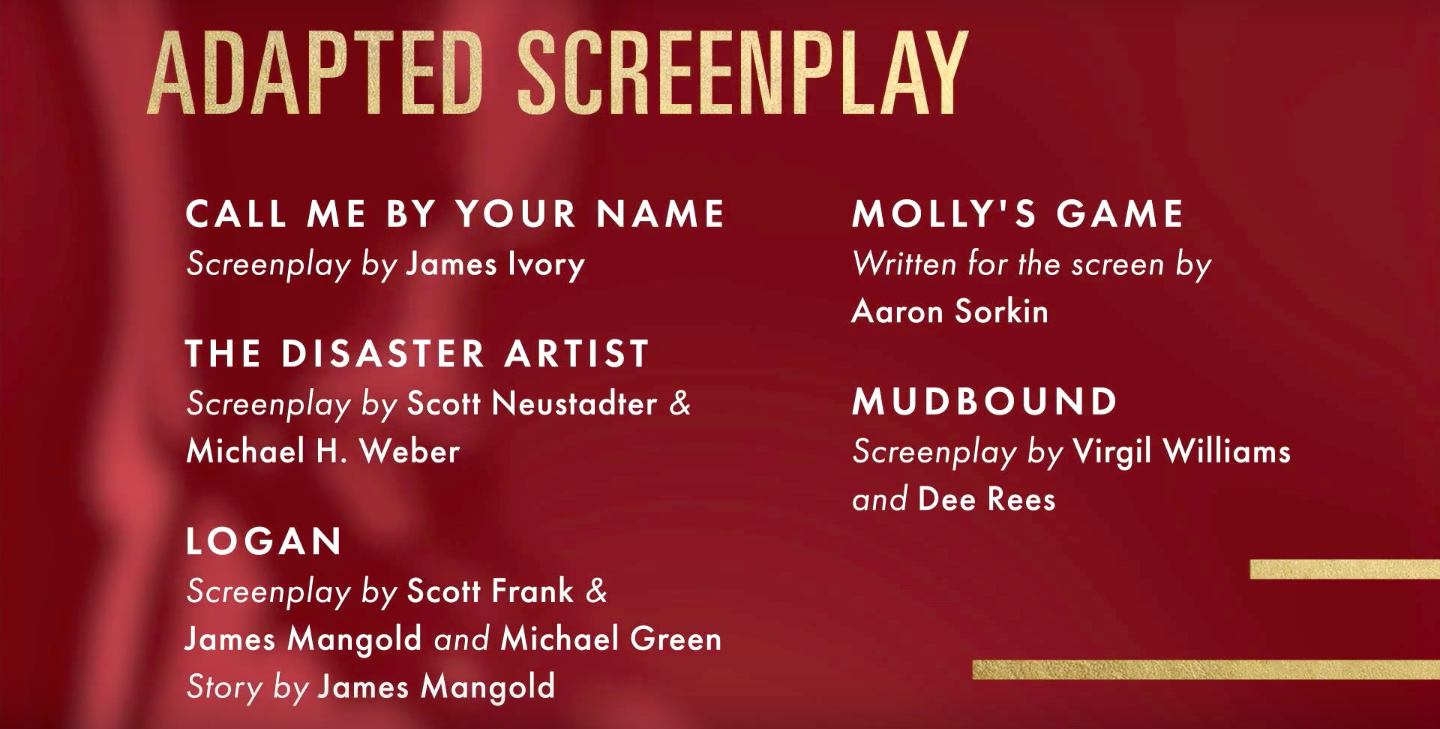Jorge continues to dive into the Oscar writing nominees.

Last week we dove into the nominees for Original Screenplay, which was an incredibly crowded category from the start, and there’s not a real frontrunner at the moment; more than one candidate has strong chances. The race was always very different with Adapted Screenplays. From the very start, only Call Me by Your Name truly felt like lock, and the four other slots were anyone's guess for months. Let’s take a look at each of the scripts, and see what was it that got them here...
- Call Me By Your Name
(Read the full script here)
 Screenplay by: James Ivory
Screenplay by: James Ivory
Based on: “Call Me by Your Name” by André Aciman
The elevator pitch: Set in an Italian summer during the late 80s, Elio’s family takes in an American graduate student, which ignites in him the burning feelings of longing, desire, lust, and loss.
Screenplay length: 94 pages
Oscar History: Fourth nomination for James Ivory, but first one in Writing. He was previously nominated for Best Director in 1987 for A Room with a View, in 1993 for Howard’s End, and in 1994 for Remains of the Day.
Memorable scene: Heartbroken about the end of the love affair with Oliver, Elio goes to his father for advice, in which he states that we must feel everything that comes to us, good and bad.

- The Disaster Artist
(Read the full script here)
 Screenplay by: Scott Neustadter and Michael H. Weber
Screenplay by: Scott Neustadter and Michael H. Weber
Based on: “The Disaster Artist” by Greg Sestero and Tom Bissell
The elevator pitch: A behind-the-scenes look at the inception and production of The Room, considered to be one of the worst movies ever made, and its tortured creator Tommy Wiseau.
Screenplay length: 111 pages
Oscar History: First nomination for both writers.
Memorable scene: After walking out of the premiere because of the audience reaction, Greg goes after Tommy to reassure him that the laughter means the movie (and him) are actually a success.

- Logan
(Read the full script here)
 Screenplay by: Scott Frank, James Mangold, and Michael Green
Screenplay by: Scott Frank, James Mangold, and Michael Green
Based on: the characters of Wolverine by Roy Thomas, Len Wein, and John Romita St.
The elevator pitch: A weary Logan cares for an ailing Professor X as he attempts to hide from the world, and his past. However, his plans take a turn when a young mutant arrives, pursued by dark forces.
Screenplay length: 125 pages
Oscar History: Scott Frank was previously nominated in this same category in 1999 for Out of Sight. First nomination for James Mangold and Michael Green.
Memorable scene: Knowing his end is coming near, Professor Charles Xavier releases his conscious to who he thinks is Logan.

- Molly’s Game
(Read the full script here)
 Screenplay by: Aaron Sorkin
Screenplay by: Aaron Sorkin
Based on: “Molly's Game: From Hollywood's Elite to Wall Street's Billionaire Boys Club, My High-Stakes Adventure in the World of Underground Poker” by Molly Bloom
The elevator pitch: The true story of Molly Bloom, an Olympic-class skier who ran the world's most exclusive high-stakes poker game and became an FBI target.
Screenplay length: 199 pages
Oscar History: Aaron Sorkin won in this category in 2011 for The Social Network, and was nominated again in 2012 for Moneyball.
Memorable scene: Molly is confronted with Charlie as to why she did the things how she did them and what the consequences might be.

- Mudbound
(Read the full script here)
 Screenplay by: Virgil Williams and Dee Rees
Screenplay by: Virgil Williams and Dee Rees
Based on: “Mudbound” by Hillary Jordan
The elevator pitch: Two men return home from World War II to work on a farm in rural Mississippi, where they struggle with their respective families to deal with racism and adjusting to life after war.
Screenplay length: 118 pages
Oscar History: First nomination for both writers.
Memorable scene: Laura makes Florence a job offer to work with her in the house, in which the racial and social class differences of the two families has never been louder.

Who Should Win: Full disclosure, I’ve only seen two of the five nominees, but I am still convinced this is Call Me by Your Name’s game to lose. Yes, it is a lyrical poem about youth, desire, lost, and loss, and the way it captures its themes in small moments is hard to top. But also no one did better the “Adapted” part of the category. The movie translated the monologue-heavy passages of the book and transformed them into cinematic language. It understand the strengths of its source materials and translates them into film. Exactly what a good adaptation should do. Don't forget to vote on Who Should Win the screenplay prizes on the Oscar charts.
Will Win: Unless something truly incredible happens, this is James Ivory’s. He will become the oldest Oscar winner at 89 years old.